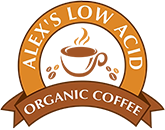What really makes a low-acid coffee low acid? Or what’s actually happening inside those perfectly roasted beans that makes Alex’s brews taste so smooth yet so full of character? We sat down for a quick-fire Q&A with Jon, our resident roasting expert, to spill the (coffee) beans on what makes Alex’s Low Acid Coffee so special from roasting science to flavor magic. Think of it as our red-carpet interview… just with more caffeine and fewer flashbulbs.
Q: What’s the biggest misconception people have about low‑acid coffee?
Jon: Oh man, there are so many. I guess starting with what low acid really means, that's the biggest misconception. I mean, shop around and you'll find so called "low acid" coffees that boast pH neutrality, and that's fine. Nothing wrong with being pH neutral. Except that it has nothing whatsoever to do with why coffee upsets your stomach. Heartburn, acid reflux, indigestion, sour stomach none of these issues have anything to do with the pH level in coffee. The culprit for your upset stomach is the Chlorogenic Acid in coffee. And the levels of Chlorogenic Acid in Alex's coffee are the lowest in the industry resulting in far fewer instances of heartburn, acid reflux, indigestion, etc.
Q: How does our roasting approach differ from traditional roasters?
Jon: We are dramatically different. Traditional roasters roast coffee in a drum roaster. That's basically a big iron kettle that's heated to hundreds of degrees, coffee is placed inside, it's stirred around a bit, and it roasts. The heat from the iron radiates into the coffee bean. That's conduction roasting. Been around since forever. We don't roast by conduction. We roast by convection. Instead of using hot iron, our coffee is roasted in a stream of super heated air. This is air roasting, or "fluid bed roasting". It's convective and way more efficient than drum roasting. The heat energy from the hot air is transferred directly to the coffee bean enabling us to precisely control of how quickly the green coffee absorbs heat energy. The better your control, the better the beans taste.
Q: How do you balance smoothness without sacrificing richness or complexity in flavor?
Jon: It's a function of how well you can control your heat transfer into the coffee bean. [The] coffee absorbs heat energy during the first part of the roast, and expels it during the latter part of the roast. Failure to control that rate of absorption and expulsion results in a funky tasting coffee bean. However, if you can track what's happening to the green coffee in real time, and effect change in temperature at exactly the right moment, you can control your flavor profile which determines how smooth, rich, and complex the coffee turns out. Our tech and experience gives us exactly that level of control.
Q: What goes into choosing the beans and blends for Alex’s Low Acid Coffee?
Jon: We're always on the hunt for high quality 100% organic Arabica coffees. We are blessed with excellent relationships with our green coffee farms, mills, and co-operatives. Our suppliers know exactly what we're looking for, and always have a keen eye out for something special for us. We sample coffees in our lab every morning. All part of the process of selecting and roasting exactly the right beans for Alex's coffees.
Q: What’s your reaction to all the 5‑star reviews and positive feedback your roasts receive?
Jon: Hah. I try not to look. It taps into the obsessive part of me that doesn't always serve, so I try very hard not to look. I'm in the cupping lab every morning with Brad. We sample everything we roast and know when it's exactly right and when it needs some work. Good reviews are a by product of that work [I'm] happy to have em, just as happy not to see 'em.
Q: Why did you choose to work with Alex’s Low Acid Coffee, and what makes this brand special to you?
Jon: Simple. Alex asked all the right questions. [Alex] said he wanted to develop a low acid coffee that's actually stomach friendly, actually alleviates the symptoms associated with acidic coffees. There's plenty of so-called "low acid" coffees out there making all kinds of claims. Alex wanted to do it right. We did the research, met with the coffee scientists, and began sample roasting in earnest. At the end of the day, we submitted our coffees for independent laboratory testing and were delighted to learn that our coffees are among the lowest in the industry for levels of gut damaging Chlorogenic Acids.
Q: For someone new to low‑acid coffee, where do you recommend they start — and why?
Jon: If you experience stomach issues secondary to coffee consumption, it's a no brainer. Our coffees are gentle on your stomach. Period. I mean, the reviews speak for themselves. But it's so much more than that. Our coffees are creamy and smooth, full bodied, and flavorful. There's a coffee in Alex's line for everyone, not just those who have sensitive stomachs. My personal favorite is the Half-Caff. If you're a light to medium roast kinda person; start with Rise & Shine or Half Caff. Need a bit more body, the Espresso or French Roast will do it. If you're a decaf drinker, you can't go wrong with our Decaf [it's] creamy and smooth with a marshmallow and milk chocolate presence.
Behind every bag of Alex’s Low Acid Coffee is serious science, genuine care, and a whole lot of passion. Whether you’re here for a gentler cup or simply chasing better flavor, our roasts are designed to love you back — sip after sip. Ready to taste what all the buzz (and five-star reviews) are about? Explore our lineup and find your perfect brew today.

